|
Science Illustrator Nicolle Fuller shows how art can help visualize the future, explain the invisible, and portray cosmic findings.
Fuller runs the US-based science communication agency SayoStudio. With its team of science-loving artists, SayoStudio provides award-winning science animation, illustration, and design to help visualize scientific concepts in a way that captures attention and gets important details across.
She notes there are many uses for the work of science illustrators that many people may not immediately recognize. In fact, scientific artworks appear harmoniously in nature parks, zoos, textbooks, and science publications. “It’s a great way to bridge the divide between people who are scientists and people who might not know as much but are interested, or maybe people who weren’t interested and are now going to get a little more curious,” she says. If choosing science illustrating as a career, Fuller suggests it might be helpful to focus on getting a science background first and then brushing up on art skills second. This approach, she finds, can be beneficial in the field. In the latest episode of the Crick Crack Science Live Show Fuller shows examples from SayoStudio’s gallery that help visualize the future of work, the possible effects of plastic pollution, the intricate workings of a cell, the formations of earth-like planets, black holes colliding, and more. View the full, pre-recorded episode today at 12:30 pm AST on Facebook, LinkedIn or Twitter @upcommspr or catch the replay (and more) at the Sci-TechKnoFest 2.0 (Science, Technology, Knowledge Festival) from March 21-27, 2022 via the UpComms PR virtual booth. Related tags: #scienceart #science #illustration #careers #visualize #cosmic #cells #planets #magazine #journals #parks #scicomm #communication
0 Comments
UpComms PR Collaborates with NIHERST to Provide Science Content at Caribbean Science Festival3/17/2022 UpComms PR announced today that it has joined the list of NIHERST content partners to provide science content at Sci-TechKnoFest 2.0
On showcase are the Crick Crack Science Podcast series “Bats of Bat Island,” and pre-recorded episodes from the Crick Crack Science Live Show featuring women in science: zoologist Amy Deacon, translational scientist Nikesha Gilmore, and US-based science illustrator Nicolle R. Fuller. The episodes discuss topics such as biodiversity, women and girls in science, cancer research, and art and science as a career.
According to festival organisers, the hybrid event, with its mix of online and in-person experiences “promises to bring greater public awareness and understanding of advancements in science, technology, and innovation, its impact on our everyday life and well-being, and its vital role in promoting economic prosperity, social progress, and environmental sustainability.” UpComms PR founder Valene Mc Dougall says, “we are very proud and excited to collaborate with NIHERST in one of—if not—the largest science festivals in the Caribbean region.” From virtual workshops to science talks and in-person experiences, there’s so much to do and see at Sci-TechKnoFest 2.0. The festival is FREE of charge and caters to all, from preschoolers to older adults. To learn more visit www.scitechknofest.org. (Attendees may also register here.) 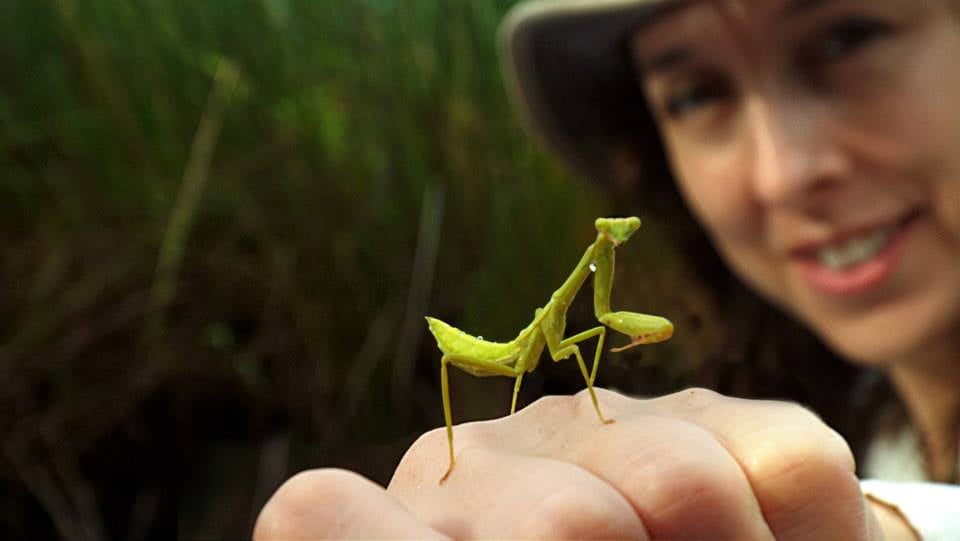 Photo credit: Dr. Amy Deacon For girls who are thinking about pursuing a career in science, try investigating professions beyond medicine and engineering advises zoologist and lecturer at the University of West Indies (UWI), St. Augustine Campus, Amy Deacon.
“There are many interesting and cool areas in science,” said Deacon on the special Crick Crack Science Live Show hosted by UpComms PR on February 8, 2022, in recognition of International Day of Women and Girls in Science. “There are so many different jobs,” she explained. “Even though you might feel some pressure to go into one of those very established careers that everyone has heard of, don’t get penned in by that. If [science is] something that you're really interested in, then, persist and go for it because we need more, people like you,” she said. Not being pigeonholed herself, Deacon’s interests include behavioral ecology, invasive species, patterns of biodiversity, and aquatic ecology. She has conducted research on Trinidad’s guppy and freshwater biodiversity. In one project, she and her team worked on finding a noticeable effect on rivers due to our love of river limes here on the islands of Trinidad and Tobago. “We revisited rivers four times a year for five years--the same rivers,” said Deacon. “At that point, we were particularly interested in recreational disturbance. In other words, river limes. People use the rivers not so much these days because, you know, there're [COVID-19] restrictions in place. But generally, people love to spend time at rivers eating, drinking, playing music, and just relaxing--and you can have an impact on those rivers. So, we were interested to see if we could detect like a signature of a river-lime effect on the species and the environment.” Deacon and her team have plans to continue their work later this year along with a couple ongoing projects at the UWI Department of Life Sciences. One such project, “Improving the Accessibility of National Biodiversity Data in Trinidad and Tobago," involves collecting and uploading data on specimens or records of local species for open access online. The project, supported by a grant by the Global Biodiversity Information Facility via its Biodiversity Information for Development, is in partnership with the National Herbarium of Trinidad and Tobago, The University of the West Indies Zoology Museum, and the National Museum and Art Gallery of Trinidad and Tobago. “It's a great team and actually it's an all-female team. Our aim over the next 18 months is to upload and publish as much of that data as possible,” says Deacon. Asked whether she encountered gender stereotypes along the path to her career in science, Deacon said she’s been lucky not to. “I haven't had very many direct experiences that have been negative in that regard. But it definitely is something that I know people do encounter and, of course, it's something that, even subconsciously, you know, we all get affected by.” As Deacon’s work may involve trekking through the forests and stepping in and around rivers and streams, she dismisses any stereotype that suggests women are somehow less capable. “There're certainly some people who might perceive that women would be less able to do field work: less strong or less willing to get dirty. I think that is a stereotype that you have to kind of combat a bit--with the idea that we can do that just as well as men can,” she said. However, Deacon points out that there still appears to be a glass ceiling when it comes to reaching certain ranks in academia. “When I was recruited as a lecturer, there were five of us recruited at the same time at the lecturer level, and all of us were women, which was amazing,” she said. “It was great to have that cohort together to support each other, but if you look high up the ranks [at, for instance,] the senior lecturer professor, it just diminishes. Those senior positions are very much still male dominated even today.” Certainly, more diversity can only make things better Deacon agrees. “I do feel strongly that in all fields–and, maybe, what I know is [the field of] science--it's clear that having a community that is diverse in terms of your background, in terms of your gender, and in terms of your ethnicity--all of those things--bring diversity, which brings new perspectives and you're going to be more productive; you might make more discoveries.” Click here to view the full episode of this Crick Crack Science Live Show. The International Day of Women and Girls in Science promotes equality in science and more access to and participation by girls and women in science, technology, engineering, and math fields. The occasion is observed by the United Nations on February 11 each year.
Here are a few statements from our panellists:
Mr. Donald Baldeosingh, Founder, Carbon Zero Institute of Trinidad and Tobago: “We approach science communication form the standpoint of the Greta Thunbergs of the Caribbean. There are many young people of the region who have something to say, and I think we have to give them room to speak.” Dr. Legena Henry, Lecturer, Renewable Energy: “The answers of our Caribbean region moving into the future are not simple answers. They are not ad hoc answers. It’s not just politics. It’s actually the product of strategy, meticulous thinking—very much a numbers game—and that has to become part of public awareness.” Dr. Renique Murray, Researcher, Engineer: Science communication also influences “value recognition” and “deriving value from our citizenry.” “I do think [our citizens] have a significant role to play in terms of bringing solutions and bringing approaches that are simply lying there, like gems in the sand.” Dr. Kirk Douglas, Director, Centre for Biosecurity: “There are a number of biosecurity issues [where] we understand that humans are a significant part of the problem, from climate change to illegal wildlife trade to several issues, even COVID-19. But, just as well, humans play a very critical role in being the solution. So, communication is essential for behavioral change.” Dr. Graham King, Lecturer, Automotive Engineer: “In Trinidad and Tobago, in particular, we have a very wasteful society, and so I think science communication is very important to actually address that and bring people to a greater sense of social responsibility on a personal or family level. In fact, in Trinidad we use more energy per GDP dollar generated than any other country in the world except Congo. In other words, our economy is the second least energy efficient in the world, which is a very damning statistic. It does [suggest] that we could really be making a lot more money in the GDP level if we used our energy a lot more efficiently.” Related Tags: #climate #resilience #4thindustrialrevolution #access #awareness UNCTAD UNESCO CARICOM Secretariat #economy #GDP #Trinidad #Biosecurity #Renewable #Energy #science #communication #social #responsibility |
AuthorValene Mc Dougall Archives
March 2022
Categories |

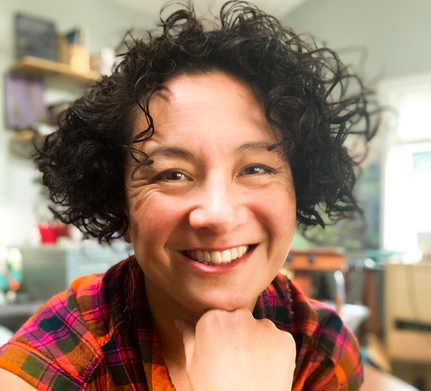
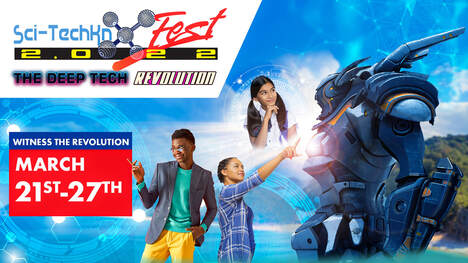
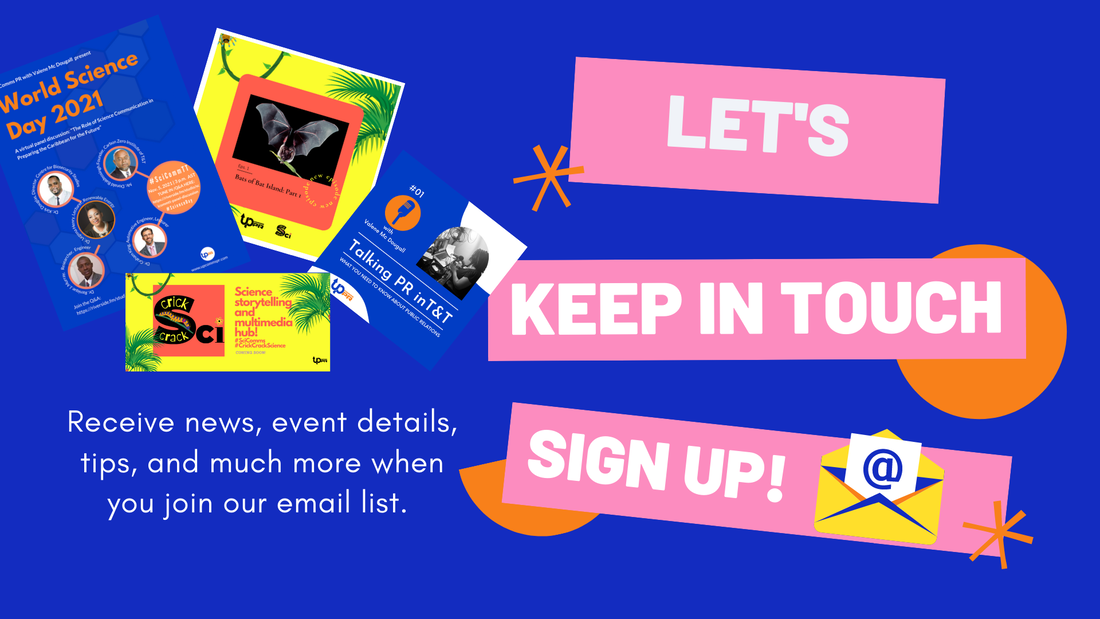
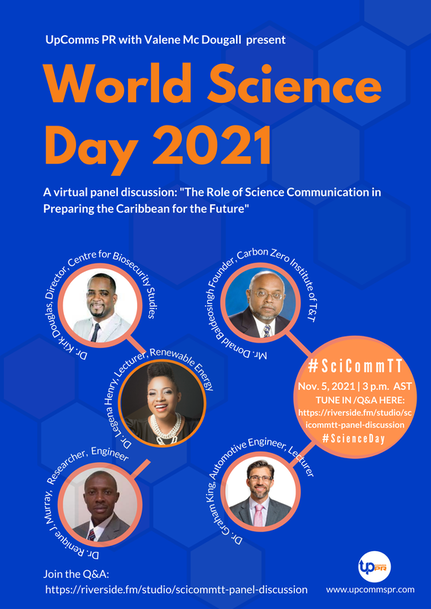
 RSS Feed
RSS Feed
